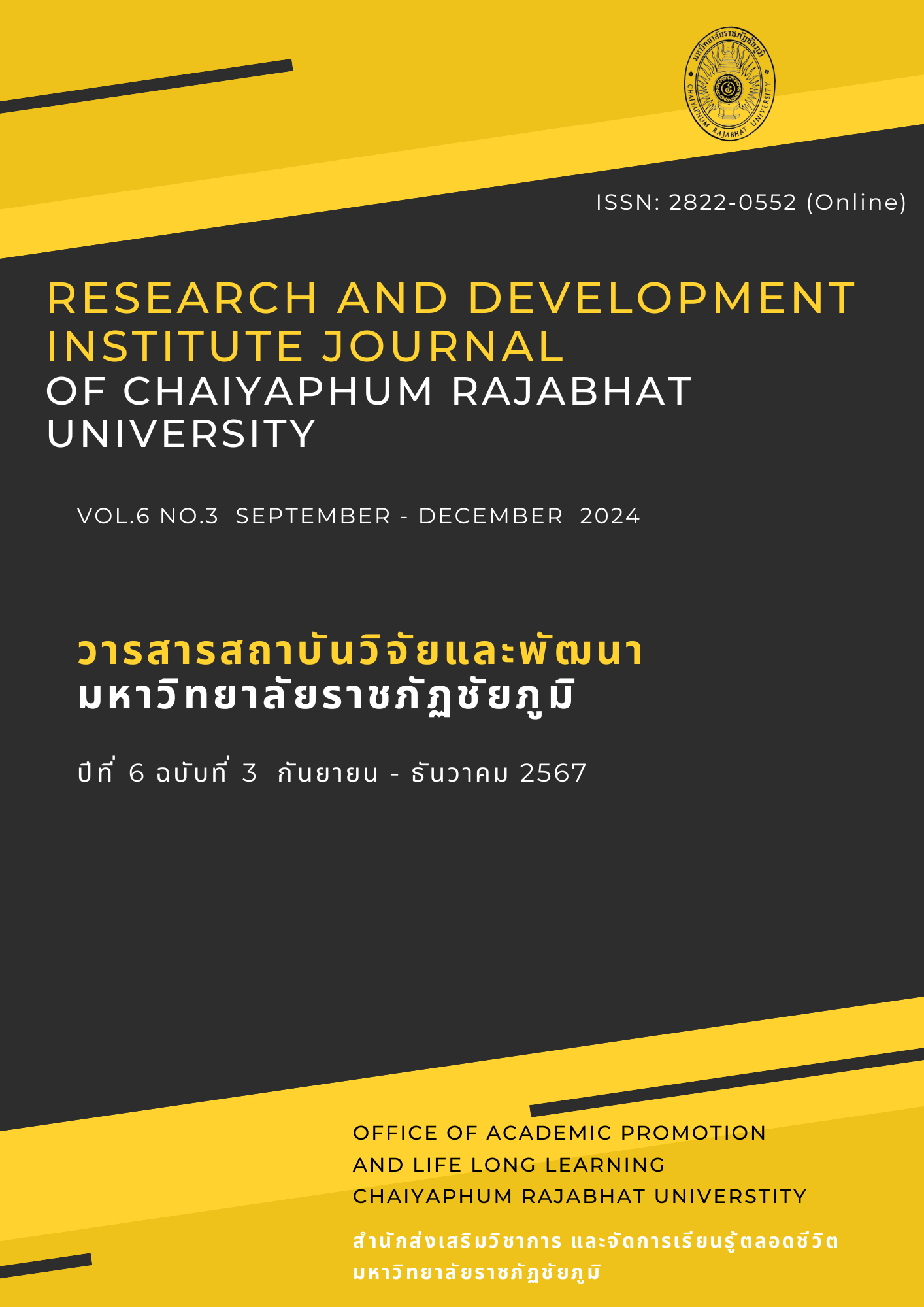THE DEVELOPMENT OF CURRICULUM TO STRENGTHEN EARLY CHILDHOOD TEACHER CAPACITY IN CURRICULUM DESIGN AND DEVELOPMENT CHILD AS RESEARCHER CLASSROOM TO PROMOTE EARLY CHILDHOOD CREATIVITY
Main Article Content
Abstract
This research aims to develop and study the results of the trial of the early childhood teacher competency enhancement curriculum in the design and development of researcher-based child-level curriculum to promote early childhood creativity. The research methodology involved three phases: 1) Study basic information about the competency of early childhood teachers in designing and developing classroom curriculum. 2) Developing a training curriculum and 3) Experiment and study the results of the trial of the curriculum. Target audience for the course trial Teacher at the Kindergarten Level 3, Semester 2 of the 2023 Academic Year Schools in the Teacher Professional Experience Training Network in Early Childhood Education, Faculty of Education, Buriram Rajabhat University 25 people. This is obtained by specific selection. The tools used in the research include: Training Course Materials and Accompanying Manual for Using the Training Course, Questionnaire to assess the appropriateness and feasibility of the Early Childhood Teacher Competency Framework, Early Childhood Teacher Competency Test on Knowledge, Early Childhood Teacher Competency Assessment Form, Competency Measurement of Early Childhood Teachers in Characteristics, and a satisfaction assessment. Statistics used to analyze the data, percentages, averages, and standard deviations.
The research results found that: 1. The Early Childhood Teacher Competency Framework for the Design and Development of Child-Researcher Classroom Curriculum to Promote Early Childhood Creativity consists of 3 core competencies, 10 sub-competencies, and 36 indicators, namely 5 competencies in knowledge, 2 competencies in skills, and 3 competencies in attributes. 2. The curriculum has 8 components as follows: 1) Curriculum History, 2) Curriculum Principles, 3) Curriculum Objectives, 4) Early Childhood Teacher Competency in Curriculum Design and Development, 5) Curriculum Content Structure, 6) Curriculum Activities, 7) Curriculum Materials and Learning Resources, 8) Curriculum Measurement and Evaluation. According to the results of the quality inspection of the training course by experts, it was found that the elements of the draft curriculum The overall average in all aspects was the highest (M = 4.68, SD = 0.46) and the consistency index was between 0.57-1.00. The average is included in the largest level (M = 4.68, SD = 0.44). 3. The results of the course trial showed that: 1) Knowledge competencies after training are higher than before training.2) Skills competency after training There is an average of 2 performances, which is at a very good level. (M = 4.70, SD = 0.10) 3) Competency before and after training There is an average of all 3 competencies at the highest level. (M = 4.54, SD = 0.03) In addition, teachers are satisfied with the use of the training curriculum at the highest level. (M = 4.69, SD = 0.46)
Article Details

This work is licensed under a Creative Commons Attribution-NonCommercial-NoDerivatives 4.0 International License.
Permission to use text, content, images, etc. of publication. Any user to read, download, copy, distribute, print, search, or link to the full texts of articles, crawl them for indexing, pass them as data to software, or use them for any other lawful purpose. But do not use it for commercial use or with the intent to benefit any business. Published under a Creative Commons Attribution-NonCommercial-NoDerivatives 4.0 International License.

This work is licensed under a Creative Commons Attribution-NonCommercial-NoDerivatives 4.0 International License
References
กนกอร ปราชญ์นคร. (2550). การพัฒนาหลักสูตรการอบรมเสริมสร้างสมรรถนะข้าราชการประจำศูนย์ปฏิบัติการต่อสู้เอาชนะยาเสพติดจังหวัด. [วิทยานิพนธ์ปริญญาดุษฎีบัณฑิต]. มหาวิทยาลัยศรีนครินทรวิโรฒ ประสานมิตร.
กระทรวงศึกษาธิการ. (2560). หลักสูตรการศึกษาปฐมวัย พุทธศักราช 2560. ชุมนุมสหกรณ์การเกษตรแห่งประเทศไทย.
กระทรวงศึกษาธิการ. 2561) คู่มือหลักสูตรการศึกษาปฐมวัย พุทธศักราช 2560 สำหรับเด็กอายุ 3-6 ปี. ชุมชนสหกรณ์การเกษตรแห่งประเทศไทย.
กระทรวงศึกษาธิการ. (2565). รายงานผลการประเมินพัฒนาการนักเรียนที่จบหลักสูตรการศึกษาปฐมวัย พุทธศักราช 2560 ปีการศึกษา 2563. สำนักงานคณะกรรมการการศึกษาขั้นพื้นฐาน
เกษศิรินทร์ ศรีสัมฤทธิ์. (2556). รูปแบบการพัฒนาวิชาชีพเพื่อเสริมสร้างสมรรถภาพครูด้านการจัดประสบการณ์ที่ส่งเสริมทักษะกระบวนการทางวิทยาศาสตร์และจิตวิทยาศาสตร์ของเด็กปฐมวัย. [วิทยานิพนธ์ปริญญาดุษฎีบัณฑิต]. มหาวิทยาลัยศิลปากร.
โชติกา กุณสิทธิ์. (2563). การพัฒนาหลักสูตรฝึกอบรมเสริมสร้างสมรรถนะการจัดประสบการณ์การเรียนรู้วิทยาศาสตร์ตามแนวคิดการใช้สมองเป็นฐานสำหรับครูปฐมวัย สังกัดสำนักงานเขตพื้นที่การศึกษา ประถมศึกษาสกลนคร เขต 1. [วิทยานิพนธ์ปริญญาดุษฎีบัณฑิต]. มหาวิทยาลัยราชภัฏสกลนคร.
บุญชม ศรีสะอาด. (2553). การวิจัยเบื้องต้น. (พิมพ์ครั้งที่ 8). สุวีริยาสาส์น.
ปัญจนาฏ วรวัฒนชัย. (2565). ความรู้พื้นฐานเกี่ยวกับความคิดสร้างสรรค์. วารสารครุศาสตร์สาร. 16(1), 14-31.
พชรวิทย์ จันทร์ศิริสิร. (2562). สมรรถนะและการจัดการเชิงกลยุทธ์. ตักสิลาการพิมพ์.
วิชัย วงษ์ใหญ่. (2535). การพัฒนาหลักสูตรแบบครบวงจร. สุวีริยาสาส์น.
สลิลนา ภูมิพาณิชย์. (2563). การพัฒนาหลักสูตรเสริมสมรรถนะการออกแบบการจัดการเรียนรู้ โดยใช้กระบวนการชี้แนะและการเป็นพี่เลี้ยงสำหรับครูในสังกัดองค์กรปกครองส่วนท้องถิ่น. วารสารศึกษาศาสตร์ มหาวิทยาลัยนเรศวร, 21(1), 261-276.
สิริมา ภิญโญอนันตพงษ์. (2547). รายงานการวิจัยเรื่องการพัฒนาโครงการเด็กนักวิจัยและการประเมินเน้นเด็กเป็นสำคัญ. มหาวิทยาลัยศรีนครินทร์วิโรฒ.
สิริมา ภิญโญอนันตพงษ์. (2553). การวัดและประเมินแนวใหม่: เด็กปฐมวัย. ดอกหญ้าวิชาการ.
สำนักงานคณะกรรมการข้าราชการพลเรือน. (2548). สมรรถนะในระบบข้าราชการพลเรือนไทย. สำนักงานคณะกรรมการข้าราชการพลเรือน.
สำนักงานเลขาธิการสภาการศึกษา. (2560). แผนการศึกษาแห่งชาติพ.ศ. 2560 - 2579. พริกหวานกราฟฟิค.
อนุชิต จันทศิลา. (2559). การพัฒนาหลักสูตรฝึกอบรมเพื่อเสริมสร้างสมรรถนะด้านการจัดการเรียนการสอนโดยใช้สมองเป็นฐานเพื่อพัฒนาความสามารถด้านภาษาของผู้เรียนสำหรับครูประถมศึกษา. [วิทยานิพนธ์ปริญญาดุษฎีบัณฑิต]. มหาวิทยาลัยราชภัฏสกลนคร.
Bloom, B.S. (1976). Human characteristics and school learning. McGraw-Hill.
Brun & Judy K. (1997). Leadership Development Curriculum for Family and Consumers Sciences Under graduates. Dissertation Ph.D. (Guidance & Counseling). Iowa State University: available: UMI: Dissertation Abstracts (DAI-A 58/03).
Guvis, J.P., & M.T. Grey. (1995). The Anatomy of a Competency. Journal of Nursing Staff Development, 11(5), 247-252.
Taba, H. (1962). Curriculum development: Theory and practice. Harcourt Brace and World.


